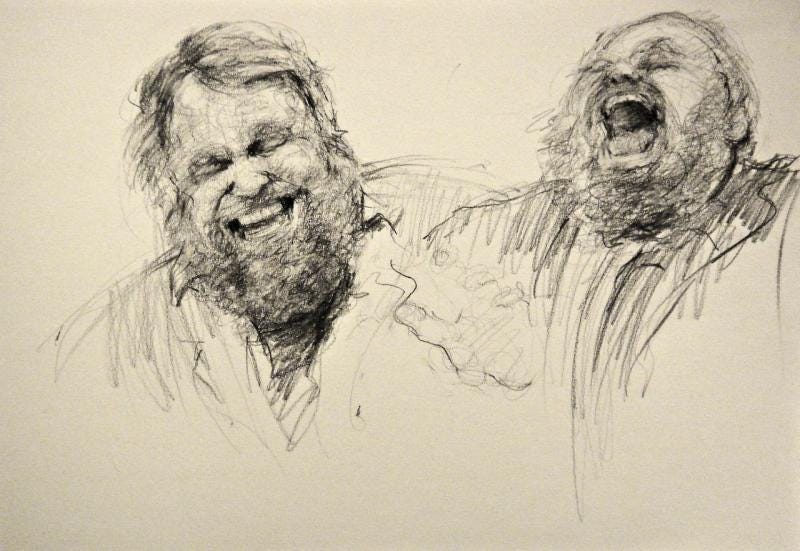
It’s not how I anticipated my Wednesday morning to have panned out but, these days, who’s to say what is or isn’t normal?
I’m reading Henri Bergson’s Laughter: An Essay on the Meaning of the Comic. It is, in fact, three essays—is that funny in and of itself?—in which the French philosopher tries to come to terms with why people laugh.
I’ll be honest, I find few things funnier than philosophers trying to talk about humour. It’s not that you can’t talk about humour as a philosopher. It’s that philosophers are probably the least equipped people to do it.
Try this for size:
A man, running along the street, stumbles and falls; the passers-by burst out laughing. They would not laugh at him, I imagine, could they suppose that the whim had suddenly seized him to sit down on the ground. They laugh because his sitting down is involuntary.
Consequently, it is not his sudden change of attitude that raises a laugh, but rather the involuntary element in this change,—his clumsiness, in fact. Perhaps there was a stone on the road. He should have altered his pace or avoided the obstacle. Instead of that, through lack of elasticity, through absentmindedness and a kind of physical obstinacy, AS A RESULT, IN FACT, OF RIGIDITY OR OF MOMENTUM, the muscles continued to perform the same movement when the circumstances of the case called for something else. That is the reason of the man's fall, and also of the people's laughter.
There is a lot to find amusing about this sort of approach to humour. On the one hand, the notion of starting from some sort of philosophical first principle and working backwards to try to determine the humorous element behind it is, in its own way, pretty funny. Seriously though: ‘Instead of that, through lack of elasticity, through absentmindedness and a kind of physical obstinacy, AS A RESULT, IN FACT, OF RIGIDITY OR OF MOMENTUM, the muscles continued to perform the same movement when the circumstances of the case called for something else.’ It’s gold.
And then there is the conclusion:
Laughter is, above all, a corrective. Being intended to humiliate, it must make a painful impression on the person against whom it is directed. By laughter, society avenges itself for the liberties taken with it. It would fail in its object if it bore the stamp of sympathy or kindness.
Shall we be told that the motive, at all events; may be a good one, that we often punish because we love, and that laughter, by checking the outer manifestations of certain failings, thus causes the person laughed at to correct these failings and thereby improve himself inwardly?
Laughter, Bergson concludes, is simply a mechanism by which groups of people monitor themselves. A ‘corrective’ by which society ‘avenges itself for liberties taken with it’, essentially ‘humiliating’ people into submission. You start to get the impression that Bergson was bullied a lot at school.
In fact, if Bergson had read Sigmund Freud, whose book Jokes and Their Relation to the Unconscious came out five years after Bergson’s essay, the conclusion of his treatise might have been completely different…
How did I end up down this rabbit hole?
Well, you have Peter Hitchens to blame for that.
The Hitchens brothers are one of British culture’s weirdest oddities: both argumentative pricks but pricks in different flavours. I would not put it beyond them to have made some pact early on in their life which was going to be which flavour—the one a smug atheist apologist and the other a smug Christian apologist—and then they just went from there.
Anyway, by some algorithmic happenstance known only to Jack Dorsey, Twitter felt it fitting for me to fly-on-the-wall Hitchens’—Peter, the smug Christian flavour of prick—most recent ‘spat’. Hitchens, it turns out, doesn’t find Titania McGrath, parody account of one of those ghouls online who see themselves as martyrs to ‘wokeness’, a self-described comedian, Andrew Doyle.
This guy:

Yep.
Anyway, back on the seventh of March—those heady days when cases of coronavirus were still in single figures—Peter Hitchens quote tweeted Titania McGrath (who you remember is the fictional creation of Andrew Doyle, instantly forgettable minor character from an ITV detective drama) with the words ‘Doesn’t do it for me.’


Tl;dr the last four days have involved Peter Hitchens ‘debating’ with people whose main line of attack seems to be ‘But Titania McGrath is funny’. To which Hitchen’s reply is:


It’s really exhilarating stuff.
But Hitchens, to his credit, did at least raise some interesting issues. Firstly, how do you explain what is or isn’t funny?


Of course, the subtlety of the gap between not being able to describe why something is funny to the assertion that ‘It just isn’t’ seems to be lost on Hitchens. No space is given for exploring the—for want of a better word—subjectivity of humour. Presumably because the essentialist Hitchens probably wants to assume the existence of something like ‘funniness in all times and in all places’. Let’s not go there.
But then he pushes us in the direction of Bergson:


The influence of Bergson here is admitted by Hitchens: he seems happy to accept that laughter is structured as a form of social conditioning, a way of getting people to conform to group norms, and that Doyle’s supporters are engaging in behaviour which confirms this.


What Hitchens has alighted upon is the notion that the conception of what is or isn’t considered funny is based, in some real sense, upon power. It is all well and good trying to argue for an objectivist or subjectivist account of humour (although one would think a full-blown Foucaultian critique of humour would lead one to doubt the existence of an objectivist account of humour), but there can be little disagreement that humour can be a means of manipulation.
Which got me thinking about a question that Mark Thompson posed in January and I’m still thinking about now:

As I read it, Mark is asking a comparable question to the one Hitchens raises when talking about the nature of ‘good’ humour: what is ‘good’ writing? how can we encourage it? to what extent is it commensurable across fields?
In many respects, I appreciate Mark’s direction of thought: the world of football writing would be vastly improved if people gave more consideration to these sorts of ‘meta’ questions.
As before, though, I’m nervous at the idea of the existence of a sort of ‘unified theory of language’: that there is one ‘good’ way to write and it applies in all times and at all places. What may be ‘good writing’ for a piece on a statistical phenomenon may not be ‘good writing’ for an op-ed piece.
Can you imagine Jonathan Liew writing for StatsBomb, for example? Would it be better to narrativise a stats piece? Or would it simply be at cross purposes to what a stats writer is trying to achieve? If Liew were to write a stats piece, wouldn’t he just end up writing more like a good stats writer? Mark himself, for instance?
So I find myself well and truly on the subjectivist side of that debate. But I wanted to raise the second issue that Hitchens raises in his spat with Titania McGrath: what role does power play in our determining what is or isn’t good writing?
I want to let you into a dirty secret: I don’t enjoy reading Marina Hyde. I don’t know why. But in the words of the esteemed Peter Hitchens, ‘Doesn’t do it for me.’
I hasten to add that I can see why people do enjoy Maria Hyde. And I don’t intend this to be some of mic drop moment; I’m sure she doesn’t care about me not enjoying her oeuvre (and I’m sure she’d repay the favour if she was ever unfortunate to read me by accident).
But there is a strange phenomenon that exists around Marina Hyde’s writing. Here’s the first tweet (that isn’t Marina Hyde sharing her own work) that shows up when you search Twitter for Marina Hyde:


Now I don’t know who Simon Ubsdell is—his bio reads ‘If you a big fan of repressive, nativist, Johnsonian populism, you're not going to like anything I have to say’ and he has 15k followers, hence why he showed high up my search no doubt—but he belongs to a group of people, many of whom are big in the football media, who champion Hyde’s work with similar plaudits attached.
It might be pointed out that I’m unfair in singling out Marina Hyde in this regard when there are other potential targets who are generally accepted to be brilliant within the wider cultural milieu. Hyde though, and I could have mentioned Jonathan Liew in this regard too, are held up as the standard because they are excellent at what they do.
They are not the target here: they can’t help being so good at their jobs that they accrete almost universal acclaim to themselves. I am more interested in the idea that, much like in the case of the purveyors of Titania McGrath, the idea of what is good becomes tied up with social ideas, expectations of the group: in short, with power.
Of course, it’s easy for me to sit here and decry this behaviour when it’s of a writer who ‘doesn’t do it for me’. But it does invite the question of how I am involved in the power struggle over ‘good writing’ as it unfolds on Twitter. I am not shy with my opinions of what is ‘good’ and ‘bad’ when it comes to football writing.
Am I simply no different to the masses on Twitter other than being in a minority when it comes to my opinion about good writing?
Where do we go from here?
It would be ironic, no doubt, if I went from this point into some sort of prescriptivist recipe for determining good writing.
I suppose that where I want to go, though, is to the ethereality of writing—good or bad. In many respects, we shouldn’t have expectations about writing: the author puts their pen to paper or fingers to the keyboard and the result is always open to being surprising.
And this is where the power struggle over ‘good’ writing becomes an issue: because it narrows our expectations of what is possible, it forces us to conform to a certain style or approach, it leads us to dismiss writing that we have already pigeon-holed as being bad.
So that’s where I’ll end this. By encouraging us—myself included—to have a more expansive attitude to ‘good’ writing.
But don’t worry, Peter. You can still hate Titania McGrath.


